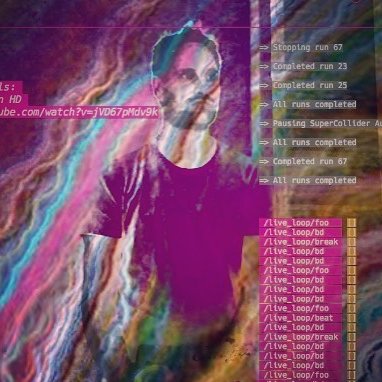#538 — February 4, 2021 |
|
💡 We're taking a one week break from the new Tip of the Week section to take the opportunity to interview Sam Aaron of the Sonic Pi project which has just had a new release :-) Check that out at the end of this issue. |
 |
Ruby Weekly |

|
|
Sonic Pi 3.3 Released: The Rubyish Live Coding Music Synth — There’s a full interview with Sonic Pi’s creator at the bottom of this issue, but basically Sonic Pi lets you do live music related coding in a dialect of Ruby. It’s really fun and here’s a 4-minute video showing how it works. 3.3 adds Big Sur support, some new synths and effects, and general improvements. Sonic Pi |
|
Writing an Instant Poll Rails App in a Single File — You might be surprised how little code it takes to create a functional Rails app. We were. Here’s the actual code. Darren Broemmer |

Ship Your Updates 2x Faster — Get build times under 10 minutes, deploy more often, and stay ahead of the competition. Semaphore sponsor |
|
Super Bombinhas 1.0: A Ruby-Powered Platform Game — We’ve linked this a few times in the past year as it’s a surprisingly slick platform game developed in Ruby – not something you see very often! It’s just hit 1.0 and is considered ‘finished’ by its creator. Enjoy the code or just enjoy the game at itch.io. Victor David Santos |
|
Zeke Sikelianos |
|
The RailsConf 2021 CFP — This year RailsConf (April 13-15) is a virtual three-day event and proposals for speaking are due February 15th, so check out these guidelines and submit your talk today. Ruby Central |
|
Quick Bits
|
📘 Articles & Tutorials |

|
|
Parallelism in Ruby with Ractors — Another look at the new Ractor API introduced by Ruby 3.0, complete with basic examples and a visual explanation. Lorenzo Barasti |
|
Behind the Scenes of Devise — There are loads of articles on Devise (the popular authentication library) but this one digs into the code and how it uses Warden for much of its heavy lifting. Ariel Juodziukynas |
|
Ruby Garbage Collection Deep Dive: Jemma Issroff |
|
Free eBook: Speed Up a Search Query from Seconds to Milliseconds pganalyze sponsor |
|
Converting a Two Character ISO Country Code to an Emoji Flag — OK.. that’s a clever little trick. Andy Croll |
|
3 Practical Uses of Ruby's Emmanuel Hayford |
|
Debugging an Assertion Error in Ruby — When Tenderlove writes a blog post, it’s an insta-click, no? You’re almost certainly never going to run into the issue he had here in the guts of MRI, but I’m glad he’s taking care of it(!) Aaron 'Tenderlove' Patterson |
|
Using Postgres Partial Indexing from Rails — “Postgres has a nice feature where you can index only the values you want to query on. Today I learned that Rails has a nice shortcut for taking advantage of said feature.” John Nunemaker |
|
Understanding the Emmanuel Hayford |
|
How to Completely Uninstall and Reinstall Homebrew-Based Postgres — Is Postgres erroring with “could not read block 39” or “bad address”? If you installed Postgres via Homebrew on a Mac, here’s the quickest way to wipe the slate clean with a fresh install Justin Searls |
|
The Goodies in Rails Event Store 2.x Tomasz Wróbel |
🛠 Code and Tools |
|
WorkingHours: A Gem to Do Time Calculations with Working Hours — For example, Adrien S |
|
Launch: Scheduled Autoscaling on Heroku — Don’t fear another slowdown. Autoscale based on request queues and background job latency, now on your schedule. Rails Autoscale sponsor |
|
Introducing Sqlcommenter: An Open Source ORM Auto-Instrumentation Library — An open source library that enables ORMs to augment SQL statements before execution, with comments containing information about the code that caused its execution. Available for certain ORMs in Python, Java, Node.js and Ruby. GitHub repo. Bala Chandrasekeran (Google Cloud) |
|
Database Cleaner 2.0: Strategies for Cleaning Databases in Ruby — A very long standing project but it’s still getting updated :-) Ben Mabey |
|
Cucumber 5.3.0: Run Automated Tests Written in Natural Language Cucumber |
💻 Jobs |
|
Full-Stack Engineer (Rails, JavaScript, AWS) — We’re looking for an experienced engineer, open to working remote, to work on one of our new products: Zinc, a cloud-based, real-time communication application. ServiceMax |
|
Backend Engineer (Ruby on Rails) — Remote — We’re looking for devs with a passion for Rails and building for scale. No sprinting, no scrumming, work normal hours. CompanyCam |
|
Find a Job Through Hired — Create a profile on Hired to connect with hiring managers at growing startups and Fortune 500 companies. It's free for job-seekers. Hired |
ℹ️ Interested in running a job listing in Ruby Weekly? There's more info here. |
|
